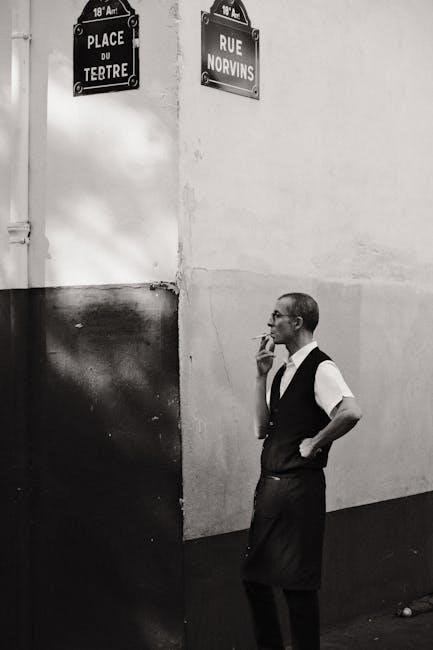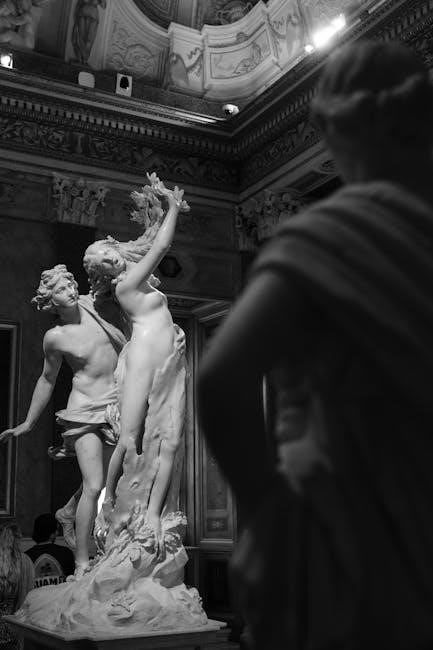Daphne du Maurier’s Rebecca, published in 1938, is a gothic romance and psychological thriller. The story follows a young woman who marries Maxim de Winter, grappling with the legacy of his late wife, Rebecca, and uncovering dark secrets tied to jealousy and obsession.
1.1 Overview of the Novel
Rebecca, a gothic romance and psychological thriller by Daphne du Maurier, explores themes of love, jealousy, and identity. Published in 1938, it follows a young woman who marries Maxim de Winter, returning to his estate Manderley, where the memory of his late wife Rebecca haunts her. The novel’s dark, atmospheric tone and complex characters have made it a timeless classic, available in PDF and other formats for readers worldwide.
1.2 Historical Context and Publication
Rebecca was first published in 1938, becoming an instant bestseller. Daphne du Maurier drew inspiration from her personal life and real figures, crafting a tale of love, jealousy, and obsession. The novel’s success led to its adaptation into a film by Alfred Hitchcock in 1940. Today, it remains widely available in PDF and other formats, continuing to captivate readers with its timeless themes and gothic atmosphere.
Plot Summary
A young, unnamed protagonist marries Maxim de Winter, returning to his estate, Manderley, where the memory of his deceased wife, Rebecca, haunts her, revealing dark secrets and obsessions.
2.1 The Storyline and Main Characters
The young, unnamed protagonist marries Maxim de Winter, a widowed aristocrat, and moves to his estate, Manderley. There, she faces the oppressive memory of Maxim’s late wife, Rebecca, and the sinister housekeeper, Mrs. Danvers, who idolizes Rebecca; The story explores the protagonist’s struggle to uncover truths about Rebecca, her death, and Maxim’s past, revealing a web of jealousy, secrets, and obsession.
2.2 Key Themes and Conflicts
The novel delves into themes of jealousy, identity, and social class. The protagonist’s insecurity and Mrs. Danvers’ loyalty to Rebecca fuel the central conflict. Maxim’s hidden past and the mystery of Rebecca’s death drive the plot, while the oppressive atmosphere of Manderley symbolizes the suffocating grip of the past on the present, highlighting the struggle for belonging and truth in a rigid societal framework.

Daphne du Maurier: The Author
Daphne du Maurier, born in 1907, was a British author renowned for her gothic fiction and psychological thrillers. Her works, like Rebecca, explore themes of love, secrets, and the supernatural, captivating readers worldwide.
3.1 Biography and Writing Style
Daphne du Maurier, born on May 13, 1907, in London, England, was a British author celebrated for her mastery of gothic fiction and psychological thrillers. Her writing style blended suspense, romance, and atmospheric settings, as seen in Rebecca. Drawing inspiration from Cornwall’s landscapes, her works often explored themes of love, isolation, and the supernatural, leaving a lasting impact on literature.
3.2 Inspiration Behind “Rebecca”
Daphne du Maurier’s inspiration for Rebecca stemmed from her fascination with the Cornish coast and her own life experiences, including her marriage and struggles with identity. The novel was also influenced by real-life figures and her interest in the complexities of human psychology, particularly themes of jealousy and obsession, which are central to the story.

Major Themes in “Rebecca”
Rebecca explores themes of jealousy, obsession, and identity, intertwined with gothic elements. The novel delves into the psychological effects of societal pressures and the haunting presence of the past, creating a chilling yet captivating atmosphere that defines du Maurier’s signature style.
4.1 Gothic Elements and Atmosphere
Daphne du Maurier masterfully crafts a gothic atmosphere in Rebecca through the eerie setting of Manderley, a decaying mansion shrouded in mystery. The novel’s oppressive tone, fueled by the enigmatic presence of the late Rebecca, creates a sense of foreboding. The descriptions of Manderley’s grandeur and decay, along with the unsettling character of Mrs. Danvers, heighten the psychological tension, immersing readers in a world of secrets and haunting memories.
4.2 Jealousy and Obsession
Rebecca explores the destructive power of jealousy and obsession through its characters. The second Mrs. de Winter is consumed by jealousy of Rebecca’s memory, while Mrs. Danvers obsessively preserves Rebecca’s legacy. Maxim’s secretive past reveals a complex interplay of love, guilt, and obsession, driving the plot’s dark and tragic trajectory, highlighting the devastating consequences of these emotions on relationships and identity.
4.3 Social Class and Identity
Rebecca examines the tension between social class and personal identity. The unnamed protagonist, from a humble background, struggles to navigate the aristocratic world of Manderley, contrasting sharply with Rebecca’s embodiment of privilege and sophistication. This divide underscores the societal pressures of the time, as the narrator grapples with her new role and the lingering influence of Rebecca’s elite status, revealing class-driven insecurities and the quest for self-definition.

Downloading “Rebecca” in PDF Format
Rebecca is widely available in PDF format, with free and paid options on platforms like Litres and Google Drive. The novel can also be downloaded legally from various e-book repositories, ensuring easy access to Daphne du Maurier’s timeless classic for readers worldwide.
5.1 Sources for Free and Paid Downloads
Various online platforms offer free and paid PDF versions of Rebecca. Google Drive and Litres provide direct downloads, while public domain archives offer free access. Some sites require registration, but others, like certain repositories, allow downloads without signing up. The novel is available in multiple formats, including PDF and EPUB, in both English and Russian, with some versions adapted for language learners, ensuring accessibility for a broad audience.
5.2 Formats and Editions Available
Rebecca is available in PDF, EPUB, FB2, and TXT formats, catering to diverse reader preferences. Original and adapted versions, including annotated editions, are accessible. Some platforms offer B2 level adaptations for language learners, ensuring broad accessibility. The novel’s timeless appeal is enhanced by its availability in multiple formats, making it easy for readers worldwide to engage with du Maurier’s classic tale.

Adaptations of “Rebecca”
Rebecca has been adapted into various forms, most notably the 1940 film by Alfred Hitchcock, starring Joan Fontaine and Laurence Olivier. Television and stage adaptations further highlight its enduring appeal.
6.1 The 1940 Film Adaptation by Alfred Hitchcock
Alfred Hitchcock’s 1940 adaptation of Rebecca became a landmark film, starring Joan Fontaine as the second Mrs. de Winter and Laurence Olivier as Maxim. The movie faithfully captures the novel’s gothic atmosphere and psychological tension, with Judith Anderson’s chilling portrayal of Mrs. Danvers. It was Hitchcock’s second adaptation of du Maurier’s work and won the Academy Award for Best Picture, solidifying its legacy.
6.2 Television and Stage Adaptations
Rebecca has been adapted numerous times for television and stage, each interpretation capturing the novel’s haunting essence. A notable TV adaptation aired in 2008, featuring Christopher Cazenove and Janet Maw, while stage productions have brought Manderley to life through atmospheric sets and performances. These adaptations continue to intrigue audiences, preserving du Maurier’s timeless tale of love, jealousy, and mystery for new generations.

Critical Reception and Legacy
Rebecca received critical acclaim and commercial success, becoming a gothic classic. Its exploration of jealousy and identity continues to captivate readers and inspire adaptations, ensuring its enduring legacy.
7.1 Initial Reviews and Popularity
Rebecca was an instant bestseller upon its release in 1938, praised for its gothic atmosphere and psychological depth. Critics lauded du Maurier’s storytelling, with many noting its cinematic qualities. The novel’s exploration of jealousy and identity resonated widely, solidifying its place as a classic. Its popularity soared further with Alfred Hitchcock’s 1940 film adaptation, introducing the story to an even broader audience.
7.2 Cultural Impact and Modern Relevance
Rebecca remains a cultural touchstone, influencing literature and film. Its themes of identity and jealousy are timeless, resonating with modern readers. The novel’s exploration of female roles and societal pressures continues to spark discussions. Its gothic elements have inspired countless adaptations, ensuring its relevance in contemporary popular culture and academic studies, making it a enduring classic of 20th-century literature.

The Setting of Manderley
Manderley, the grand estate, is central to the novel, symbolizing beauty, decay, and secrets. Its gothic atmosphere and imposing presence deeply influence the characters and narrative.
8.1 Description and Symbolism
Manderley, the grand estate, is vividly described as a place of haunting beauty and decay. Its overgrown gardens and derelict state symbolize the lingering presence of Rebecca and the narrator’s struggle to replace her. The house mirrors the characters’ emotional states, embodying themes of love, loss, and obsession, while its grandeur contrasts with the darkness beneath its surface.
8.2 Influence on the Plot and Characters
Manderley’s grandeur and isolation profoundly shape the characters and plot. The house’s oppressive atmosphere mirrors the narrator’s feelings of inadequacy and Mrs. Danvers’ obsessive loyalty to Rebecca. Its hidden passages and secrets symbolize the unseen forces driving the story, while its decay reflects the unraveling of relationships and the lingering presence of Rebecca, fueling tension and psychological conflict throughout the novel.
The Character of Rebecca
Rebecca, Maxim de Winter’s late wife, is a mysterious and powerful presence in the novel. Her beauty, strength, and enigmatic personality leave a lasting impact on the characters and plot, even after her death, as her legacy haunts the narrator and Manderley, revealing dark secrets and unresolved tensions.
9.1 Her Role in the Story
Rebecca plays a pivotal role in the story as the enigmatic and deceased first wife of Maxim de Winter. Despite her absence, her presence is deeply felt throughout the novel. She is portrayed as a captivating and dominant figure whose memory haunts the narrator, influencing her relationship with Maxim and shaping the plot’s tension and mystery. Rebecca’s character serves as both a catalyst and a central theme, driving the psychological dynamics and uncovering hidden truths about Manderley and its inhabitants.
9.2 Psychological Impact on Other Characters
Rebecca’s presence permeates the novel, shaping the psychological dynamics of the characters. The narrator feels overshadowed by her legacy, experiencing insecurity and inadequacy. Maxim de Winter is haunted by his past with Rebecca, while Mrs. Danvers obsessively venerates her memory. Rebecca’s influence fuels tension, fear, and rivalry, creating a toxic atmosphere that dominates the lives of those at Manderley.

Study Resources and Guides
Various study resources, including PDF guides and analysis tools, are available for Rebecca. These materials offer insights into themes, characters, and symbols, aiding deeper understanding of the novel.
10.1 Discussion Questions and Analysis
Discussion questions for Rebecca often focus on themes like jealousy, identity, and social class. Analysis may explore the psychological depth of characters, the gothic atmosphere, and the symbolism of Manderley. PDF guides provide insights into these elements, aiding readers in understanding the novel’s complexity and its enduring appeal. These resources also offer essay prompts for deeper exploration of the text’s layers.
10.2 Essay Topics and Literary Analysis
Potential essay topics for Rebecca include analyzing the narrator’s journey of self-discovery, the role of jealousy in shaping relationships, and the symbolism of Manderley. Literary analysis might explore the novel’s gothic elements, the psychological tension between characters, and the societal pressures on women. PDF guides offer detailed insights, helping students craft well-supported arguments and deepen their understanding of du Maurier’s masterpiece.

The PDF Format’s Popularity
The PDF format’s popularity stems from its accessibility and convenience, allowing readers to access Rebecca and other works easily across devices, with options for highlighting and searching text, making it a preferred choice for both casual readers and academic purposes.
11.1 Advantages of Reading “Rebecca” in PDF
Reading Rebecca in PDF offers unparalleled accessibility and convenience. The format allows readers to access the novel on various devices, with features like adjustable font sizes and search functionality. PDFs also enable easy highlighting and note-taking, making it ideal for both casual readers and students analyzing the text. Additionally, the availability of free and paid PDF versions ensures that the novel remains widely accessible to a global audience.
11.2 Accessibility and Convenience
The PDF format ensures Rebecca is accessible on multiple devices, offering readers flexibility and ease. Its digital availability allows global access, making it convenient for readers to download or read online. Features like adjustable font sizes, bookmarks, and search functions enhance readability. Both free and paid versions cater to diverse preferences, ensuring the novel remains widely accessible and user-friendly for all audiences.
Comparisons with Other Works
Rebecca is often compared to other gothic novels, showcasing du Maurier’s mastery of suspense and psychological depth. Its intricate plot mirrors themes found in her other works, like The Birds, solidifying her reputation as a pioneer of gothic fiction.
12.1 Similar Gothic Novels
Rebecca shares themes of mystery and suspense with novels like Wuthering Heights and Jane Eyre. These works explore atmospheric settings, complex characters, and dark secrets, making them akin to du Maurier’s style. Readers of gothic fiction often appreciate these parallels, as they evoke similar emotional responses through their haunting narratives and explorations of human psychology.
12.2 Du Maurier’s Other Works
Daphne du Maurier’s works include Jamaica Inn, Frenchman’s Creek, and The Birds. These novels, like Rebecca, blend suspense, romance, and psychological depth, showcasing her mastery of gothic storytelling. Her writing often explores themes of isolation, secrets, and the supernatural, captivating readers across genres and establishing her as a literary icon.
Rebecca remains a timeless gothic masterpiece, captivating readers with its atmospheric tension and psychological depth. Its enduring popularity ensures it continues to be widely read and appreciated, with PDF versions readily available for modern readers to enjoy Daphne du Maurier’s classic tale.
13.1 Final Thoughts on the Novel
Rebecca by Daphne du Maurier is a masterful blend of gothic mystery and psychological insight. The novel’s exploration of love, jealousy, and identity continues to resonate with readers. Its intricate characters, particularly the enigmatic Rebecca, leave a lasting impact; The availability of Rebecca in PDF format ensures its accessibility to new generations, preserving its legacy as a literary classic.
13.2 Encouragement to Read or Download
Rebecca is a timeless tale that continues to captivate readers with its rich storytelling and psychological depth. The PDF format allows for easy access, making it simple for new readers to discover why this novel remains a beloved classic; With its atmospheric setting of Manderley and complex characters, it’s a must-read for fans of gothic romance and literary masterpieces.
